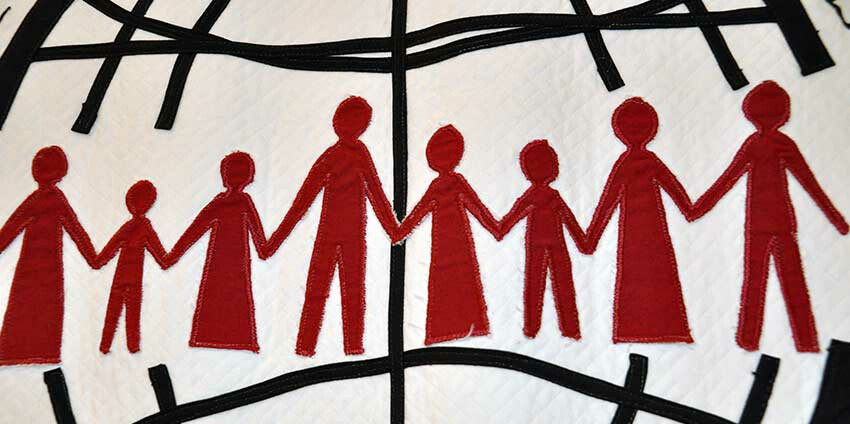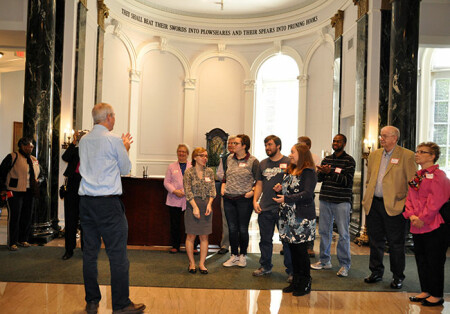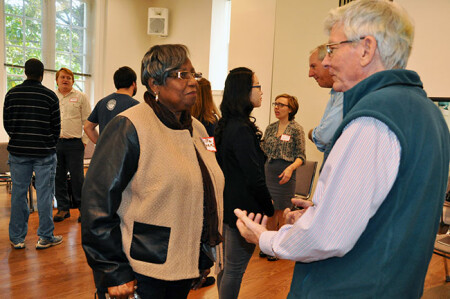What do United Methodists believe about faith in the world?

The Social Principles are 73 statements, approved by the denomination’s General Conference, that stand as instruction and a biblical and theological witness to issues facing the world today.
These statements address six areas: the natural world, and the nurturing, social, economic, political and world communities.


This fall, the Baltimore-Washington Conference Board of Church and Society led a session to help United Methodists understand the need to live faith, seek justice and pursue peace in their communities, nation
Wilson explained that the Book of Resolutions is a companion volume to the denomination’s Book of Discipline. It provides details that further illuminate the Social Principles. The Book of Resolutions contains the official positions and pronouncements of the denomination on a vast array of subjects.
The new 2016 Book of Resolutions is expected to go on sale in mid-January.
Between the quadrennial sessions of General Conference, the General Board of Church and Society, headquartered on Capitol Hill in Washington, D.C., serves as stewards of the Social Principles, working to advocates for the United Methodist stance.
“United Methodists do not need to agree on every issue,” Wilson said. “They are not church law. But are intended to be ‘instructive and persuasive in the best of the prophetic spirit.’”
What do United Methodists believe? The Board of Church and Society have a number of resources at the disposal of every local church. According to the Social Principles:
Abortion
“Our belief in the sanctity of unborn human life makes us reluctant to approve abortion. … But we are equally bound to respect the sacredness of the life and well-being of the mother and the unborn child.”
Clean Water
“We believe water is a sacred gift from God. We further believe water is a basic human right and not a commodity to be traded for profit.”
Climate Justice
“We support efforts of all governments to require mandatory reductions in greenhouse gas emissions and call on individuals, congregations, industries
Criminal Justice Reform
“In the love of Christ, who came to save those who are lost and vulnerable, we urge the creation of a genuinely new system for the care and restoration of victims, offenders, criminal justice officials and the community as a whole.”
Death Penalty
“We believe the death penalty denies the power of Christ to redeem, restore and transform all human beings.”
The Economy
“We claim all economic systems to be under the judgment of God no less than other facets of
The Environment
“All creation is the Lord’s and we are responsible for the ways in which we use and abuse it.”
Gun Violence
“God deplores violence in our homes and streets, rebukes the world’s warring madness,
Health
“Health Care is a basic human right.”
HIV/AIDS
“We support the rights of [all individuals living with HIV and AIDS] to employment, appropriate medical care, full participation in public education and full participation in the Church.”
Human Trafficking
“We deplore all forms of commercialization and exploitation of sex. … To lose freedom and be sold by someone else for sexual purposes is a form of slavery, and we denounce such business and support the abused and their right to freedom.”
Hunger and Poverty
“As a church, we are called to support the poor and challenge the rich. To begin to alleviate poverty, we support such policies
Immigration
“We oppose immigration policies that separate family members from each other or that include detention of families with children, and we call on local churches to be in ministry with immigrant families.”
Living Wage
“Every person has the right to a job at a living wage.”
Mental Health
“The United Methodist Church pledges to foster policies that promote compassion, advocate for the access to care and eradicate stigma within the church and in communities.”
During this quadrennium, leading up to the 2020 General Conference, the General Board of Church and Society will be leading efforts to rewrite the Social Principles to make them more in keeping with the context of the global church.
Learn more about the Social Principles.
